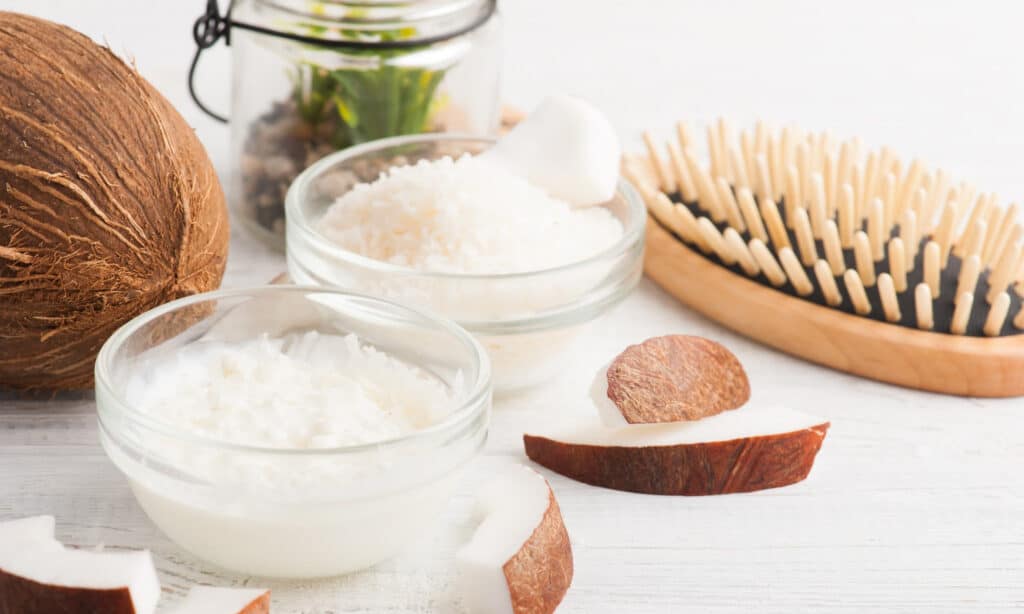The Coconut Oil Doggy Dilemma: Do I Have to Rinse My Pup?
If you’re a pet parent, you’ve probably heard about the wonders of coconut oil. It’s been touted as a cure-all for everything from dry skin to bad breath in dogs.
But with all the buzz surrounding this natural remedy, there’s one question that keeps popping up: do I have to rinse my dog after applying coconut oil? Before we can answer that question, let’s take a closer look at why coconut oil is so popular among dog owners in the first place.

The Benefits of Using Coconut Oil on Dogs
Coconut oil is packed with medium-chain fatty acids, which have been shown to provide various health benefits for dogs. Some of the most notable benefits include:
- Promoting Healthy Skin and Coat: The fatty acids in coconut oil can help moisturize dry skin and reduce itchiness. It can also improve coat texture and shine.
- Aiding Digestion: Coconut oil has antibacterial properties that can help combat digestive issues like constipation or diarrhea. It may also improve nutrient absorption.
- Boosting Immunity: Coconut oil’s lauric acid has immune-boosting qualities that can aid dogs with its antifungal, antimicrobial, and antiviral properties.
The Proper Way to Apply Coconut Oil to Your Dog
Firstly, it’s important not to apply too much coconut oil. A little goes a long way.
Apply only enough so that your pup doesn’t look greasy or wet afterward. When using unrefined virgin coconut oil, warm it up slightly in your hands before applying it onto their coat/skin.
Then gently massage it into their skin, starting from the neck and working your way down their body. You can also apply a small amount to their paw pads.
Try not to apply directly to their face, especially near their eyes or mouth. Instead, use a soft cloth or cotton ball to spread it onto the areas that need attention.
Do You Need to Rinse Off Coconut Oil from Your Dog?
No, you do not have to rinse off coconut oil from your dog. The vast majority of dogs will not experience any negative side effects from leaving coconut oil on their skin and coat.
In fact, the longer it stays on, the more time it has to absorb into their skin and provide benefits. Some dog owners choose to rinse off coconut oil after application. They’re usually worried about attracting dirt or creating a mess around the house.
But unless your pup is prone to rolling in mud or dust immediately after application, there’s really no need for concern. If your dog has sensitive skin or allergies, consult with your vet before using any new products.

Potential Risks of Leaving Coconut Oil on Your Dog
While leaving coconut oil on your pup is generally safe, there are some potential risks you should be aware of:
- Attracting Dirt: Coconut oil is oily in nature and can attract dirt if too much is applied.
- Skin Irritation: While rare, some dogs may develop skin irritation as a result of using coconut oil. If you notice redness or itching after applying coconut oil to your pup’s coat/skin then discontinue use immediately.
Listen To Your Pup
The decision of whether you want to rinse coconut oil off your dog or not ultimately comes down to personal preference. If you’re concerned about attracting dirt or creating a mess, then it’s fine to rinse it off. But if you want your pup to get the full benefits of coconut oil, then leaving it on is perfectly fine.
Just be sure to monitor how your dog responds after use. Always start with a small amount and gradually increase the quantity as needed.
And if you notice any adverse reactions, stop using immediately and consult with your vet. So go ahead and pamper your pooch with some lovely coconut oil – they’ll thank you for it!
The Benefits of Using Coconut Oil on Dogs
Coconut oil has become increasingly popular over the years, and not just for human consumption. Many pet owners have started using coconut oil on their furry friends as well. There are a variety of benefits that come with using coconut oil on your dog. These include promoting healthy skin and coat, aiding in digestion, and boosting immunity.

Promoting Healthy Skin and Coat
One of the benefits of using coconut oil on dogs is that it can promote healthy skin and coat. Coconut oil contains medium-chain fatty acids that act as a natural moisturizer for your dog’s skin. It can also help soothe dry or irritated skin by reducing inflammation.
Coconut oil also contains lauric acid. This compound has antimicrobial properties that can help prevent infections such as hot spots or flea bites. Additionally, applying coconut oil to your dog’s fur can make it shinier and softer to the touch.
Aiding in Digestion
Coconut oil can also aid in digestion for dogs. The medium-chain fatty acids found in coconut oil are easily digestible. They can provide energy quickly without being stored as fat.
This means that it can be particularly helpful for dogs with sensitive stomachs or digestive issues. Furthermore, coconut oil has been shown to improve nutrient absorption in dogs by assisting with the breakdown of fat-soluble vitamins like A, D, E, and K. By improving nutrient absorption and aiding in digestion, coconut oil may help boost your dog’s overall health.
Boosting Immunity
Another benefit of using coconut oil on dogs is its ability to boost their immune system. Lauric acid found in coconut oil has been shown to have antiviral properties. Coconut oil may help fight off viruses such as canine influenza or parvovirus.
Additionally, taking regular doses of coconut oil has been linked to improving cognitive function. As well as reducing the risk of neurodegenerative diseases like Alzheimer’s in humans. Research on this topic is limited when it comes to dogs. It may be worth considering the potential benefits for your furry friend.

Other Potential Benefits
Aside from the benefits mentioned above, there are several other potential benefits of using coconut oil on dogs. For example, it can serve as a natural remedy for fleas or ticks by repelling them with its scent. It may also help reduce bad breath in dogs by killing harmful bacteria in their mouth.
Coconut oil has also been known to act as a natural sunscreen for dogs. This is due to its high vitamin E content. This can be particularly helpful for breeds with short hair or no hair.
Using coconut oil on your dog can provide a variety of benefits ranging from promoting healthy skin and coat to boosting immunity and aiding digestion. Further research may be needed to fully understand all of coconut oil’s potential benefits. However, incorporating coconut oil into your dog’s routine may be worth considering for improved overall health and well-being.
The Proper Way to Apply Coconut Oil to Your Dog’s Skin and Coat
When applying coconut oil to your dog’s skin and coat, it’s important to do it correctly. First, start off with a small amount of coconut oil and work it into your hands until it becomes liquid. This can be done by simply rubbing your hands together or by placing the container in a warm water bath.
Once the coconut oil is melted, gently massage it onto your dog’s skin and coat. Make sure you get all the way down to their skin, working in a circular motion.
Pay special attention to areas that tend to get dry or where they may have hot spots. Avoid excessive use of coconut oil on your dog to prevent oily residue.
A general rule of thumb is 1 teaspoon per 10 pounds of body weight. For example, if your dog weighs 30 pounds, use no more than 3 teaspoons of coconut oil at once.
In terms of frequency, applying coconut oil once or twice a week is typically sufficient for most dogs. However, if your dog has chronic dry skin or other skin issues, you may need to apply it more frequently.

Benefits of Using Coconut Oil on Your Dog’s Skin and Coat
Coconut oil provides several benefits when applied topically on dogs’ skin and coat. First and foremost, its moisturizing properties can help soothe dry or irritated skin. This makes it particularly useful for dogs with allergies or other conditions that may cause itching or rashes.
Additionally, applying coconut oil can help improve the overall appearance of your dog’s coat by making it shiny and healthy-looking. It also has antimicrobial properties that can help prevent infections caused by bacteria or fungi.
Using coconut oil on your dog’s skin and coat can help repel fleas and ticks. This is because the lauric acid found in coconut oil acts as a natural insect repellent.
Why You Should Consider Using Coconut Oil on Your Dog
If you’re looking for a natural way to improve your dog’s skin and coat health, look no further. Unlike other topical treatments that may contain harsh chemicals or irritants, coconut oil is gentle enough for even the most sensitive skin.
In addition to its moisturizing and antimicrobial properties, coconut oil is also incredibly versatile. It can be used as a standalone treatment. Or it can be mixed with other ingredients to create DIY grooming products like shampoos or conditioners.
Using coconut oil on your dog can be an affordable alternative to expensive vet treatments or grooming products. With just a few teaspoons per application, a small jar of coconut oil can last for weeks. Making it both effective and economical.

The Bottom Line
When it comes down to it, there’s no harm in leaving the coconut oil on your dog after applying it to their skin and coat. In fact, doing so may provide additional benefits by allowing the moisture from the coconut oil to continue working its magic over time.
Of course, if you’re concerned about potential risks like attracting dirt or causing irritation, rinsing off your dog after applying coconut oil is certainly an option. However, this step is not necessary for most dogs and may actually reduce the effectiveness of the treatment by washing away some of the beneficial oils.
Ultimately, whether you decide to rinse off your dog after applying coconut oil or leave it on is up to personal preference. Just remember that when used correctly, this natural remedy can be an effective way to promote healthy skin and coat in dogs of all ages and breeds.
Do You Need to Rinse off Coconut Oil From Your Dog?
Coconut oil is a popular natural remedy for dogs, and it has several benefits such as promoting healthy skin, reducing inflammation, and boosting immunity. Applying coconut oil on your dog can also help keep their coat shiny and healthy.
However, many pet owners wonder if they need to rinse off the coconut oil after applying it. The answer is that it’s not necessary but optional.

Why Rinsing off Coconut Oil is Not Necessary
Coconut oil is a natural product that is easily absorbed into the skin of both humans and pets. It doesn’t contain any harmful chemicals or toxins, so there’s no need to worry about leaving it on your dog’s skin or coat. In fact, leaving the coconut oil on your dog can provide added benefits as it will continue to moisturize their skin and fur over time.
Why Some People Choose to Rinse off Their Dogs After Applying Coconut Oil
Despite the fact that rinsing off coconut oil isn’t necessary, some pet owners prefer to do so for various reasons. One of the reasons may be that they feel like leaving the oil on their dog causes dirt and dust to stick to its fur more easily. They believe that rinsing off the excess helps prevent dirt accumulation on their dogs’ coats.
Another reason may be due to concerns about possible adverse effects of leaving too much of the product on their pets’ coats. While there are no known serious side effects resulting from using too much coconut oil topically in dogs, some pet owners prefer removing all excesses just in case.
How Often Should You Apply Coconut Oil?
The frequency with which you apply coconut oil depends entirely on your preferences or what your veterinarian recommends because every pet is unique with different needs similar to human hair care routines. If your dog has dry or itchy skin, you can apply coconut oil once or twice a week. However, if your dog’s coat is healthy and shiny, you can apply coconut oil every two weeks.
How to Apply Coconut Oil to Your Dog’s Coat
Applying coconut oil to your dog is simple. First, make sure that the coconut oil is in a liquid state.
If it’s solidified, you can melt it by placing the container in hot water for a few minutes. Next, using your fingers or a brush, gently rub the coconut oil into your dog’s skin and coat.
Make sure to massage it well so that it penetrates deep into their skin. You should also use enough amount of coconut oil to adequately treat all areas of concern.

Potential Risks of Leaving Coconut Oil on Your Dog
While leaving excess amounts of coconut oil on dogs’ coats may not be harmful per se, there are some potential risks associated with doing so that pet owners should be aware of. For instance:
- Leaving too much excess oils may attract dirt and dust which may cause mats and tangles making grooming more difficult.
- If too much of the product is applied on certain pets or in certain areas with sensitive skin or allergies, it could cause irritation or rashes.
- In some cases where dogs consume a large quantity all at once could lead to gastrointestinal issues such as diarrhea or vomiting.
When used properly with care and consideration for potential risks involved especially if it’s their first time trying this natural remedy out on their pets then pet owners can ensure the benefits outweigh the risks for their furry friends.
Potential Risks of Leaving Coconut Oil on Your Dog
The Downside of Leaving Too Much Coconut Oil on Your Dog
While there are many benefits to using coconut oil on your dog, there are also some potential risks to keep in mind. One such risk is attracting dirt, which can be a problem if you apply too much coconut oil to your dog.
This is because the excess oil can make dirt and debris stick to your dog’s fur, which can cause mats and tangles. Another potential risk of using too much coconut oil is that it can cause skin irritation.
This is especially true if your dog has sensitive skin or if the oil is left on for an extended period of time. If you notice any redness or itching after applying coconut oil, it may be best to wash it off and try a different product.
How Often Should You Use Coconut Oil?
When it comes to using coconut oil on your dog, less is often more. While it may be tempting to slather on a lot of the stuff in hopes of achieving maximum benefits, doing so can actually do more harm than good.
Ideally, you should only apply coconut oil once a week or as needed. This will help prevent any potential buildup or issues with attracting dirt while still allowing you to enjoy all the benefits that this natural remedy has to offer.

How Much Should You Use?
In addition to limiting how often you use coconut oil on your dog, it’s also important to carefully measure out how much you apply each time. As a general rule of thumb, one teaspoon per 10 pounds of body weight is a good starting point.
However, keep in mind that some dogs may require less (or more) depending on their individual needs and coat type. If in doubt, start with a small amount and gradually increase as needed until you find the right balance for your furry friend.
How to Avoid Potential Risks
To avoid any potential risks associated with using coconut oil on your dog, it’s important to follow some basic guidelines. First and foremost, always start with a small amount and work your way up as needed.
Additionally, be sure to choose a high-quality, unrefined coconut oil that is safe for use on dogs. Consider rinsing your dog off after applying coconut oil to help prevent any issues with attracting dirt or causing skin irritation.
The Bottom Line
Overall, there are both benefits and potential risks to using coconut oil on your dog. While it can promote healthy skin and coat and aid in digestion, it can also attract dirt and cause skin irritation if too much is used.
To use coconut oil safely and effectively on your furry friend, be sure to limit how often you apply it, carefully measure out how much you use each time, choose a high-quality product that is safe for dogs, and consider rinsing off after application. With these tips in mind, you can enjoy all the benefits of this natural remedy without putting your dog at risk.

Conclusion: To Rinse or Not To Rinse – That Is the Question
After weighing the benefits and risks of using coconut oil on your dog and leaving it on versus rinsing it off, the decision ultimately comes down to personal preference and observation of your dog’s reaction. It is clear that coconut oil can provide numerous benefits for dogs, including promoting healthy skin and coat, aiding in digestion, and boosting immunity. It can also serve as a natural alternative to chemical-laden products found in stores. However, it is important to use coconut oil in moderation as excess amounts may attract dirt or cause skin irritation.
When it comes to whether or not to rinse off coconut oil from your dog after application, there is no right or wrong answer. Some pet owners choose to rinse their dogs off after applying coconut oil due to personal preference or concern for potential risks. Others leave the oil on without any issues. Observation of your dog’s behavior and reaction is key in making this decision.
Whether or not to rinse off the oil after application ultimately depends on personal preference and observation of your dog’s behavior and reaction. By using moderation when applying coconut oil and observing how your furry friend responds, you can make an informed decision that best suits your pet’s needs.
~Sheena
